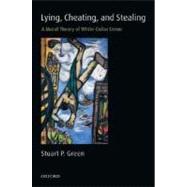Lying, Cheating, and Stealing A Moral Theory of White-Collar Crime
, by Green, Stuart P.- ISBN: 9780199225804 | 019922580X
- Cover: Paperback
- Copyright: 5/17/2007
The picture of crime that dominates the popular imagination is one of unambiguous wrong-doing - manifestly harmful acts that are clearly worthy of condemnation. The accompanying picture of the criminal - the thief, the murderer - is a picture of society's failures - to be cast out and re-integrated through a process of punishment and penance. Our understanding of white-collar crime, by contrast, is pervaded by moral and imaginative ambiguity. Such crimes are committed by society's success stories, by the rich and the powerful, and frequently have no visible victim at their root. The problem of marrying these disparate pictures has led to a confusion of the boundaries of white-collar crime. How is it possible to distinguish criminal fraud from mere lawful "puffing," tax evasion from "tax avoidance," insider trading from "savvy investing," obstruction of justice from "zealous advocacy," bribery from "log rolling," and extortion from "hard bargaining?" How should we, as scholars and students, lawyers and judges, law enforcement officials and the general public, distinguish the lawful from the unlawful, the civil from the criminal? In the first in-depth study of its kind, Stuart Green exposes the ambiguities and uncertainties that pervade the white-collar crimes, and offers an approach to their solution. Drawing on recent cases involving such figures as Martha Stewart, Bill Clinton, Tom DeLay, Scooter Libby, Jeffrey Archer, Enron's Kenneth Lay and Andrew Fastow, and the Arthur Anderson accounting firm, Green weaves together disparate threads of the criminal code to reveal a complex and fascinating web of moral insights about the nature of guilt and innocence and what, fundamentally, constitutes conduct worthy of punishment by criminal sanction. Green argues that white-collar crime is best understood through a framework of everyday moral concepts that include not only lying, cheating and stealing, but also coercion, exploitation, disloyalty, promise-breaking, disobediance, and other forms of deception. In the process, he reveals the essentially moral fabric underlying the legal category of white-collar crime.







